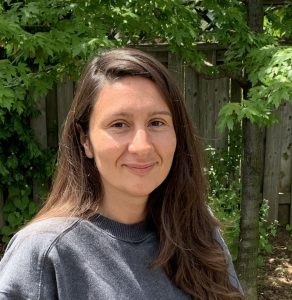The Asper Centre is excited to welcome eight new research assistants for Summer 2021, three of whom who are working directly through the Factor-Inwentash Faculty of Social Work. This year’s research assistants will be taking on many new and existing projects, including an upcoming podcast series and a ground-level Charter challenge to Canada’s voting age.
2021 Asper Centre Summer Research Assistants
Leila Far Soares

Leila will be entering her 2L year at the University of Toronto Faculty of Law. She received her undergraduate degree from the University of Toronto, where she double-majored in criminology and ethics, society & law. During her 1L year, Leila was an associate editor at the University’s Law Review as well as a member of the Asper Centre’s Prisoners’ Rights Working Group. She continues to work with the Centre this summer and her research focus is on the judicial treatment of the open court principle in the context of administrative tribunals as well as the Centre’s Law Foundation of Ontario-funded police accountability project. Additionally, she is assisting on the constitutional challenge to Canada’s voting age. In her free time, Leila enjoys reading, travelling, and watching movies.
Wei Yang

Wei will be entering his 2L year at the University of Toronto Faculty of Law. He completed his undergraduate studies at the University of Toronto, majoring in Political Science and Ethics Society & Law. In addition to his research role on many upcoming Asper Centre projects, he will also be working with the Centre on the ground-level constitutional challenge to Canada’s voting age. The Charter declares that all Canadians have the right to vote (s. 3) and to equality and non-discrimination (including on the basis of age) (s. 15). The current voting age of 18 years old thus infringes the Charter rights of young Canadians and weakens our democracy. In 1L, Wei was a member of the Asper Centre’s Refugee and Immigration Law Working Group. He is also the Co-President of UofT Law’s Asia Law Society for the 2021 – 2022 academic year.
Alison Schwenk

Alison just completed her 1L year at the University of Toronto Faculty of Law. She graduated from McGill University, majoring in Political Science. Alison will be focused on long-term projects with the Asper Centre, and is currently working with Executive Director Cheryl Milne on Clinic training responsibilities and the “Children, Youth and the Law” course at the Faculty of Law. During 1L, Alison was a member of the Asper Centre’s Indigenous Rights Working Group, where she conducted research on civil oversight of law enforcement and its impact on Indigenous peoples. She loves completing jigsaw puzzles, crosswords and sudoku (Alison also still plays the 2048 puzzle game!)
Eunwoo Lee

Eunwoo is an incoming 3L student at the University of Toronto Faculty of Law. He studied political science at York University, Glendon Campus. Eunwoo will be researching recent case law citing the United Nations Convention on the Rights of the Child (UNCRC). Given that judicial citations of the UNCRC is a relatively new phenomenon, Eunwoo hopes to discover trends and themes across the case law and how the Convention is being applied across Canada. This research will be used to develop presentable content at the National Judicial Institute Conference in 2022. Eunwoo loves to spend his free time playing jazz and funk guitar.
Szymon Rodomar
 Szymon will be entering his 3L year at the University of Toronto Faculty of Law. He studied international development, politics and sociology at Trent University. Szymon is laying the groundwork for the Asper Centre’s Podcast Project. He is currently conducting research on constitutional law cases that the Asper Centre and Faculty of Law alumni have been involved in, brainstorming possible topics and case law to discuss in each new episode. Szymon also volunteers with Law in Action Within Schools (LAWS), a education program hosted by the University of Toronto Faculty of Law and Osgoode Hall Law School that provides students from four Toronto-area high schools with a variety of extracurricular opportunities related to law and justice. Szymon is an avid runner and enjoys cooking (although he also enjoys running to visit new restaurants as well!).
Szymon will be entering his 3L year at the University of Toronto Faculty of Law. He studied international development, politics and sociology at Trent University. Szymon is laying the groundwork for the Asper Centre’s Podcast Project. He is currently conducting research on constitutional law cases that the Asper Centre and Faculty of Law alumni have been involved in, brainstorming possible topics and case law to discuss in each new episode. Szymon also volunteers with Law in Action Within Schools (LAWS), a education program hosted by the University of Toronto Faculty of Law and Osgoode Hall Law School that provides students from four Toronto-area high schools with a variety of extracurricular opportunities related to law and justice. Szymon is an avid runner and enjoys cooking (although he also enjoys running to visit new restaurants as well!).
Toolkit for Evidence-Based Child Protection Research Assistants (at the Factor-Inwentash Faculty of Social Work)
Alina Valachi

Alina is currently completing her dual JD/MSW degrees at the University of Toronto. She received her B Eng from McGill University and BSW from Dalhousie University. Alina is working at the Factor-Inwentash Faculty of Social Work as the Project Manager of the Toolkit for Evidence-Based Child Protection Practice project. This project is a Law Foundation of Ontario-funded collaboration between Dr Barbara Fallon at the Factor-Inwentash Faculty of Social Work and the David Asper Centre. This project aims to synthesize legislation, case law and social science literature in key areas of child protection practice to ensure that decisions made in the justice system reflect the best interests of children and families involved in the child welfare system. She is also the Project Lead of the Pro Bono Students Canada (PBSC) Trans ID Clinic at Friends of Ruby. In her free time, Alina enjoys mountain biking with her children and reading philosophy.
David Baldridge

David is an incoming 2L student at the University of Toronto Faculty of Law. He completed his undergraduate studies at the University of Toronto, majoring in Economics and Political Science. David is also working at on the Toolkit for Evidence-Based Child Protection Practice project this summer at the Factor-Inwentash Faculty of Social Work, where he is primarily focusing on researching relevant case law. During his 1L year, David was a member of the Prisoners’ Rights Working Group at the Asper Centre. He was also involved in the Faculty of Law’s Privacy and Cybersecurity Law Group. Outside of law school, you will see David playing trumpet in orchestras, jazz ensembles and chamber groups.
Alison Gillanders

Alison is a graduate of McGill University, majoring in International Development Studies and minoring in Philosophy. She is a research assistant for the Toolkit for Evidence-Based Child Protection Practice project at the Factor-Inwentash Faculty of Social Work. Alison will be expanding upon the project by creating new templates on matters such as openness in adoption, legislation and the case law. As part of the project, Alison will be focusing on research in the social science literature. At McGill, she was a Director of Sponsorship for McGill Women in Leadership. She eagerly awaits Toronto’s gradual reopening so she can continue biking and exploring new parks and other destinations around the city.
